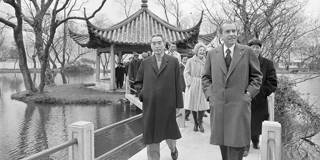Revisionist critics argue that the US president’s 1972 visit to China, far from being a diplomatic masterstroke, was a huge strategic blunder. But a policy of engagement that helped produce 40 years of peace, prosperity, and stability between two former staunch foes must be considered a resounding success.
CLAREMONT, CALIFORNIA – With China currently the only country capable of unseating America as the leading global power, many in Washington may wish that US President Richard Nixon had never made his historic trip to China 50 years ago this month. In their revisionist narrative, it was Nixon’s meeting with Communist Party of China Chairman Mao Zedong, and the policy of engagement it initiated, that helped make China an economic superpower and a geopolitical threat to America. For these critics, the Nixon visit, far from being a stroke of diplomatic genius, was one of history’s greatest strategic blunders.

CLAREMONT, CALIFORNIA – With China currently the only country capable of unseating America as the leading global power, many in Washington may wish that US President Richard Nixon had never made his historic trip to China 50 years ago this month. In their revisionist narrative, it was Nixon’s meeting with Communist Party of China Chairman Mao Zedong, and the policy of engagement it initiated, that helped make China an economic superpower and a geopolitical threat to America. For these critics, the Nixon visit, far from being a stroke of diplomatic genius, was one of history’s greatest strategic blunders.